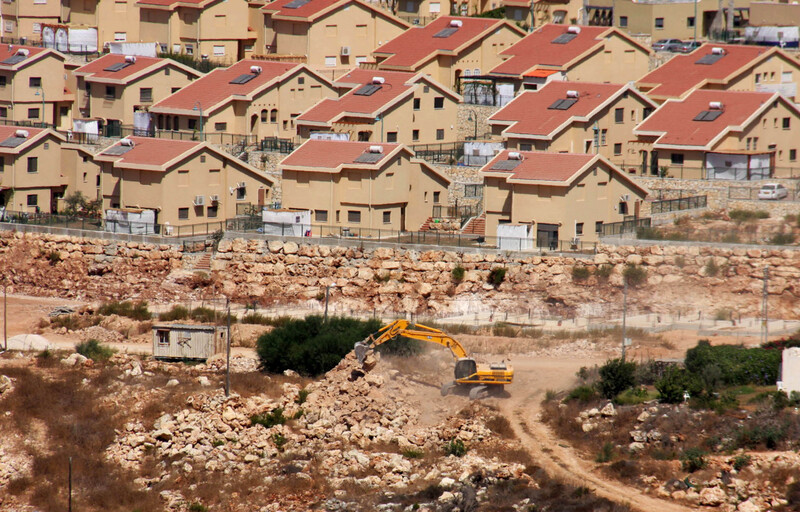Rights and Accountability 31 May 2013

Companies profitting from Israel’s settlement enterprise may be prosecuted in Dutch courts, the Netherlands’ chief prosecutor has warned.
APA imagesA recent report by the economic research and corporate responsibility group Profundo on Dutch economic links with the Israeli occupation lists Dutch companies profitting from Israel’s settlement enterprise.
Produndo identified 18 Israeli settlement companies — including Agrexco/Carmel, Edom Fruits, Hadiklaim, Mehadrin Group, Shamir Salads, Golan Heights Winery, SodaStream, Ahava Cosmetics, Keter Group plastics and Tip Top Toys — which trade with 38 Dutch companies.
Some of the Dutch companies distribute agricultural produce and Ahava cosmetics from the settlements mislabeled as “Made in Israel,” and which are sold to Dutch chains such C1000, Jumbo and Kring Pharmacies. EU consumer law requires the correct labeling of the place of origin, especially food imports.
Profundo’s findings also include the involvement of Dutch company Kardan Group NV in the construction of a sewage treatment plant on occupied West Bank land which will serve Israel’s illegal settlements.
Kardan Group NV is active in the Israeli settlements through its subsidiary Tahal Group International, an Israel-based international engineering company specializing in water and wastewater systems. Tahal Group developed the master plan for Jerusalem’s wastewater treatment system which, once completed, will serve illegal settlements in the area.
Tahal Group’s wastewater plan also includes the construction of a sewage treatment plant on Palestinian land in the area of Nabi Mussa in the occupied West Bank’s Jordan Valley, and the construction of the Og reservoir which will be used for the irrigation of date trees in settlement farms.
Dutch settlement profiteers warned
Meanwhile, the Netherlands’ chief prosecutor recently warned Dutch companies profiting from the settlements that participation in violations of international humanitarian law is a crime under Dutch law.
The prosecutor took this stand earlier this month in a letter regarding the state’s decision not to pursue criminal charges against the Dutch crane company Riwal over its involvement in Israeli violations of international law.
The letter makes it clear that the trade of products from, delivery of services to or any other involvement in Israel’s illegal settlement enterprise may result in criminal prosecution.
The prosecutor’s decision was the culmination of a three-year criminal investigation opened after the Palestinian rights group Al-Haq lodged criminal complaints against the company for its involvement in the construction of Israel’s wall and settlements in the occupied West Bank. The company’s headquarters and the residences of its directors were raided as part of the investigation.
The probe found that Riwal had rented out equipment which was used both in “the construction of the wall and an industrial site near a settlement in OPT [occupied Palestinian territory],” and the prosecutor affirmed that the construction of the wall and settlements in the West Bank “was considered to be a violation of international humanitarian law, including the Geneva Conventions of 1949.”
Israeli settlements in the occupied West Bank and its annexation of East Jerusalem are illegal under international law. Numerous UN resolutions and the 2004 advisory opinion of the International Court of Justice on Israel’s wall in the West Bank have confirmed that settlements violate Article 49 of the Fourth Geneva Convention.
Corporate culpability
While criminal charges against Riwal and its directors will not be pursued, the chief prosecutor’s letter leaves no doubt about the culpability of companies involved in such activities.
“Participation in a violation of International Humanitarian Law by Dutch persons and legal entities is a crime according to article 5 of the Dutch International Crimes Act. The Public Prosecution Service considers such a violation a serious criminal offense,” the letter states. Under Dutch law persons and companies “should not in any way be involved in, or contribute to, possible violations of the Geneva Conventions or other rules of International Humanitarian Law.”
The prosecutor further warns companies “to take decisions of authoritative international bodies and judicial institutions as the International Court of Justice extremely serious [sic].”
The prosecutor states it had decided not to pursue criminal charges against Riwal and its directors for “reasons of expediency” because part of the used equipment was rented out to third parties and therefore effective involvement of the company and its directors was considered to be relatively minor.
The probe also found that there was little danger of repetition of the crime because the company had taken far-reaching steps to permanently terminate its activities in Israel and the occupied West Bank.
The consequences resulting from the company’s involvement in the construction of Israel’s wall and settlements, including “searches of homes and company premises and by the [media] attention which ensues from the investigation,” was also taken into consideration by the prosecutor.
The prosecutor also states that necessary follow-up investigations would “consume a significant amount of resources of the police and judiciary” and that fact-finding on the ground would “most probably not be possible due to lack of cooperation from the Israeli authorities.”
However, the letter adds that new facts or circumstances could lead to a reopening of the investigation into Riwal.






Comments
The link to the report doesn
Permalink Arno Brosi replied on
The link to the report doesn't seem to be working,do you have the good one or a maybe a list of the Dutch companies involved?Thanks!
Now fixed
Permalink Maureen Clare Murphy replied on
Thank you for alerting us to the error — it’s now corrected.
the link to the letter doesn't work either
Permalink Antonio replied on
the link to the letter doesn't work either
Fixed!
Permalink Benjamin Doherty replied on
Sorry for the mistake. The link works now.